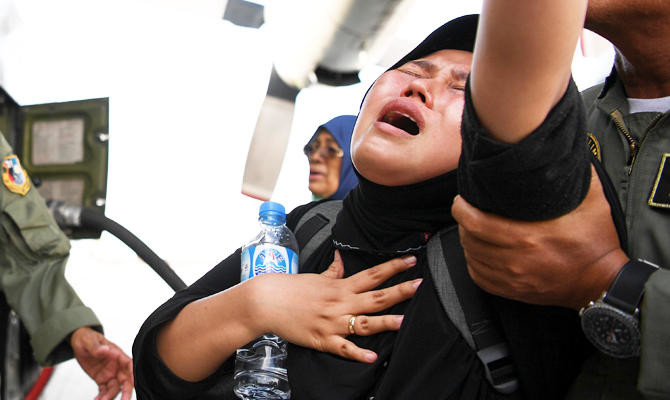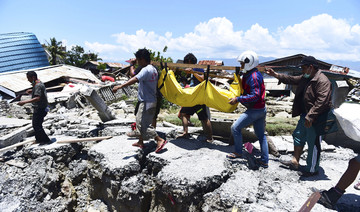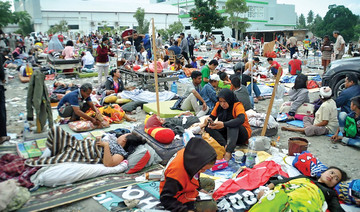PALU, Indonesia: Indonesian authorities scrambled on Monday to get aid and rescue equipment into quake-hit Sulawesi island, and prepared to bury some of the at least 832 dead, while the government said it would accept international help for disaster relief.
The confirmed toll of 832 dead looked certain to rise as rescuers slowly reached devastated outlying communities hit on Friday by a 7.5 magnitude earthquake and subsequent tsunami waves as high as six meters (20 feet).
Dozens of people were reported to be trapped in the rubble of several hotels and a mall in the small city of Palu, 1,500 km (930 miles) northeast of Jakarta, with hundreds more feared buried in landslides that engulfed villages.
“Grieve for the people of Central Sulawesi, we all grieve together,” President Joko Widodo said on Twitter late on Sunday.
Sulawesi is one of the earthquake-prone archipelago nation’s five main islands and is known to sit astride fault lines.
The national search and rescue agency said one woman was rescued overnight in the neighborhood of Balaroa, near Palu, where houses were swallowed up when the earthquake caused soil liquefaction.
Most of the confirmed deaths were in Palu, a city of 379,000 people, where authorities were preparing a mass grave to bury some of the dead as soon as they were identified.
But, nearly three days after the quake, the extent of the disaster has yet to be made clear with authorities bracing for the death toll to climb sharply — perhaps into the thousands — as connections with remote areas up and down the coast are restored.
Of particular concern is Donggala, a region of 300,000 people north of Palu and close to the epicenter of the quake, and two other districts, which have been cut off from communications since Friday.
Along with Palu, these districts have a combined population of about 1.4 million.
Five foreigners — three French, one South Korean and one Malaysian — were among the missing.
President Widodo visited a devastated housing complex on Sunday and called for patience.
“I know there are many problems that need to be solved in a short time, including communications,” he said.
The ruins would be rebuilt, Widodo said, as aftershocks rattled the region.
FUEL AND RICE
Footage of the ruined city of Palu showed a crumpled mess of houses, cars and trees mashed together, with rooftops and roads split asunder.
Officials say rescuers need heavy equipment to shift slabs of broken concrete but access to many areas has been hampered by damaged roads, landslides and collapsed bridges.
The state energy company said it was airlifting in 4,000 liters of fuel to help with the rescue effort, while the state logistics agency said it was preparing to send hundreds of tons of rice.
Finance Minister Sri Mulyani Indrawati said the government had allocated 560 billion rupiah ($37.58 million) for disaster recovery, media reported.
Indonesia, which sits on the seismically active Pacific Ring of Fire, is all too familiar with earthquakes and tsunamis. A quake off Sumatra island in 2004 triggered a tsunami across the Indian Ocean that killed 226,000 people in 13 countries, including more than 120,000 in Indonesia.
Questions are sure to be asked why warning systems set up after that disaster appear to have failed on Friday, and why more people in coastal areas had not moved to higher ground after a big quake, even in the absence of an official warning.
Sutopo Purwo Nugroho, spokesman for the National Disaster Mitigation Agency, told reporters on Sunday none of Indonesia’s tsunami buoys, one type of instrument used to detect the waves, had been operating since 2012. He blamed a fall-off in funding.
The meteorological and geophysics agency BMKG issued a tsunami warning after the quake but lifted it 34 minutes later, drawing criticism it had been too hasty.
However, officials estimated the waves had hit while the warning was in force.
The head of Indonesia’s investment board said on Twitter Widodo had agreed to accept international help and he would coordinate private sector help from around the world.
Neighbours including Australia, Thailand and China have offered help while the European Union announced 1.5 million euros ($1.74 million) in immediate aid.
























